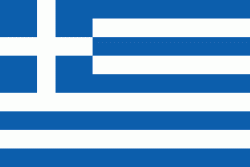Malesina (Malesína)
The region of Malesina is known for its beaches on the Northern Gulf of Euboea. The beaches of Osmaes, Vlihada, Lekouna, Arsana each year gain the "Light blue Flag" for cleanliness. There are other beaches at Gorgolimano, Papa, Mourtitsa, Mantesiou, and Kakailias.
The region of Malesina has developed into an economy based on tourism, because of its landscape and location near Athens. but also because it possesses fertile grounds and olive groves. Many residents are working in the heavy industry of Larco and in new houses construction of the Osmaes settlement.
Malesina has a structured street plan, with structural blocks, squares, streets straight from one end until the other. The sewer system, as well as the system of biological cleaning shortages, are in the stage of their completion. It has 14th-state municipal school, high school, lyceum, kindergarten, day nursery, post-office, banks, cooperatives, athletic associations, grounds, rural surgery, private dental clinic, drugstores and Center for Elder Citizens. One kilometer out of the city there are the children's camps of Ministry of External Affairs, where each summer hundreds of children from the Dissemination are entertained.
The municipality of Malesina comprises the city of Malesina, the resort of Theologos, the settlement of Osmaes (Building Cooperative of Greek Army lifer Officers) and the villages Proskyna and Mazi. Also in the municipality of Malesina is the Byzantine nunnery of Saint George, as well as the archaeological sites of Alai Lokri (in Theologos), Korseias (Chiliadou or Paliokastro Proskyna) and Voumelitea (Chiliadou or Martino).
Map - Malesina (Malesína)
Map
Country - Greece
 |
 |
| Flag of Greece | |
Greece is considered the cradle of Western civilization, being the birthplace of democracy, Western philosophy, Western literature, historiography, political science, major scientific and mathematical principles, theatre and the Olympic Games. From the eighth century BC, the Greeks were organised into various independent city-states, known as poleis (singular polis), which spanned the Mediterranean and the Black Sea. Philip II of Macedon united most of present-day Greece in the fourth century BC, with his son Alexander the Great rapidly conquering much of the ancient world, from the eastern Mediterranean to the North Western parts of India. The subsequent Hellenistic period saw the height of Greek culture and influence in antiquity. Greece was annexed by Rome in the second century BC, becoming an integral part of the Roman Empire and its continuation, the Byzantine Empire, which was culturally and linguistically predominantly Greek.
Currency / Language
| ISO | Currency | Symbol | Significant figures |
|---|---|---|---|
| EUR | Euro | € | 2 |
| ISO | Language |
|---|---|
| EN | English language |
| FR | French language |
| EL | Greek language |















